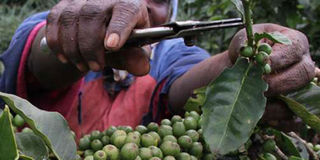Safaricom pledges to link rural farmers with Internet

A farmer prunes a coffee plant in Nyeri. The telco yesterday said it is channelling a portion of its annual Sh32 billion capital expenditure to improve Internet access in rural areas. FILE PHOTO | JOSEPH KANYI | NATION MEDIA GROUP
What you need to know:
- The telco has earmarked 23,000 public primary schools for Internet connection a move expected to help bring on board rural homes and businesses.
Telecommunications giant Safaricom is betting on farmers in rural areas to generate traffic on its Internet infrastructure whose upgrade is focused on connecting them to ease their access to markets.
The telco yesterday said it is channelling a portion of its annual Sh32 billion capital expenditure to improve Internet access in the rural areas with an aim of attaining 80 per cent 3G mobile network coverage across the country.
The telco has already earmarked 23,000 public primary schools for internet connection that are expected to act as catalyst for connecting rural homes and businesses.
Safaricom CEO Bob Collymore made the announcement at the ongoing Africa Green Revolution forum.
“Such efforts are critical in advancing an agricultural renaissance as it will allow the building of Internet platforms that can foster research and farm-to-market linkages for contemporary farmers,” said Mr Collymore, adding that access to the Internet and mobile value added services including mobile banking solutions, will promote market access as farmers can seize local and international opportunities.
He said there is need for the private sector to develop and incorporate innovations that boost agricultural production to guarantee food security and boost the agriculture sector by setting aside resources for research and innovation.
“Solving the future challenge of producing more with less in a more sustainable manner is not mission impossible. The private sector can lead from the front by setting aside more resources for research and innovation. For Africa to become the world’s bread basket, we must look at how to create agribusiness.”




